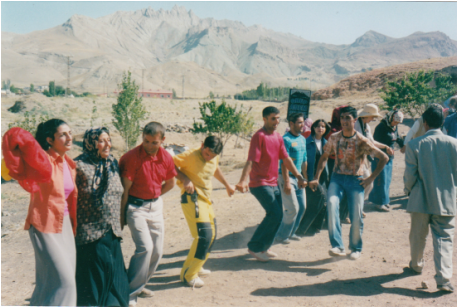
Why, people ask, do I wander the world? Why do my wife and I spend time in other countries, seeking out places that are different from those we’re used to and are comfortable in? To start with, traveling gives us perspective. As we engage with the world, we come to realize that our way is not the only way, or even the best way. It’s just one way.
A Kurdish wedding in Eastern Turkey. A Santaria ceremony in Cuba. A Buddhist temple in Burma. An Easter celebration in Bulgaria. A voodoo priest in tribal India. We see them and wonder, but all of these countries are full of people muddling along, trying to survive and find a bit of joy along the way. Leaders may be misguided, even worse, but what about the ordinary men, women, and children? Maybe they use funny toilets, eat with their fingers, dress in their own way, have different ideas about where humanity came from and where it’s going. Is that reason to fear or hate them? Or for them to hate or fear us?
There’s no pleasure to compete with the thrill of wandering unfamiliar streets, of discovering villages and towns unlike any back home, of meeting people who look, dress, speak, and think differently than we do. They’re different from me. Why are they different? Why am I different?
SNAPSHOT: Mashad, Iran. An octagonal pit four feet deep and twelve feet wide in the center of a large room, nine boys ages 11 to 13 performing strenuous exercises as a man plays on a drum. Flushed and sweating, the boys spin and jump and chant and perform ritualized calisthenics and acrobatics. After more than an hour, each boy receives a handshake, a hug, and a reward in this local “House of Strength.” In 1220 CE, the Mongols invaded this land. The Khan decreed that no male could carry a weapon or train for war, so underground gymnasiums called Zor-Khaneh were developed for mental, spiritual, and physical training. Now, Houses of Strength flourish in many Iranian towns, giving boys today opportunities to train and prepare to become leaders in a quite different world.
SNAPSHOT: Croatia, a farm near the border with Montenegro. A stone-walled kitchen, hooks for meat hanging from the ceiling, antique stone sink, Luko the farmer and his wife Mira. He’s tall, big-bellied, with salt and pepper beard. She’s slender, shy. They show us photos of the devastation to their farm during the war with Montenegro and the Serbs. They had no warning when Montenegro invaded, Luko tells us. They never imagined that such a thing could happen.
“We thought they were our friends,” he says.
Now, years after the war, we see almost no evidence of it, but it hasn’t been forgotten. Proudly, the middle-aged couple shows us the vegetable gardens, the new vineyards, the pastures and the sheep.
All this raises questions, not necessarily doubts, but a search for truth – one of the goals of travel, not only diversion or amusement. Can you tell me more about that? Why do you think that happened? Are we better individuals if we learn more, understand more? Why does the world seem to be breaking into opposing camps? Them and us? What’s going on? As a writer, I want to know. As a human being, I need to know.
SNAPSHOT: Beirut, Lebanon. A sidewalk café in the rebuilt, once cosmopolitan city center, crowded with men and women, many of whom are too young to remember war, glasses of wine or espresso cups in their hands. A country part Christian, part Moslem. Armed soldiers still visible and, still, in the hills nearby, a Palestinian camp, surrounded by soldiers. How long have those men, women, and children been there?
Rebuilding is still in progress across Beirut and Lebanon, many years after the wars – the civil war between Moslems and Christians and the war with Israel. Will downtown ever again be the Paris of the Middle East? Over it all lurks the tall, burned, shot-out shell of the Holiday Inn, where journalists hunkered during the wars, a vivid reminder visible from many parts of the city.
History is relentless. Exploring the world can raise questions, as well as provide answers. Maybe questions are better than answers. Maybe people are too quick with answers.
SNAPSHOT: Small towns all over Iran: Martyr’s Memorials with photographs of young men who died in the eight-year war with Iraq, women in black still mourning their sons and husbands who died decades ago.
We travel because every new experience raises questions, because every answer is also a question in disguise. As Rick Steves has pointed out, it’s harder to fear and hate people if you meet them. This is one of the themes of my book, DELPHINE, much of which takes place in the Middle East. Delphine discovers as she travels the world, particularly in Turkey and Palestine, that the better she knows people, the more she’ll come to care for them, perhaps even love them.
When I travel, my point of view is stretched, my eyes are opened to the variety of the world. It’s hard to be close-minded if we’ve met, eaten with, and talked with people who’ve grown up with different traditions, cultures, viewpoints than our own. Whether or not I write directly about any of this, my stories and books are richer and, I think, better, because of it.
 RSS Feed
RSS Feed